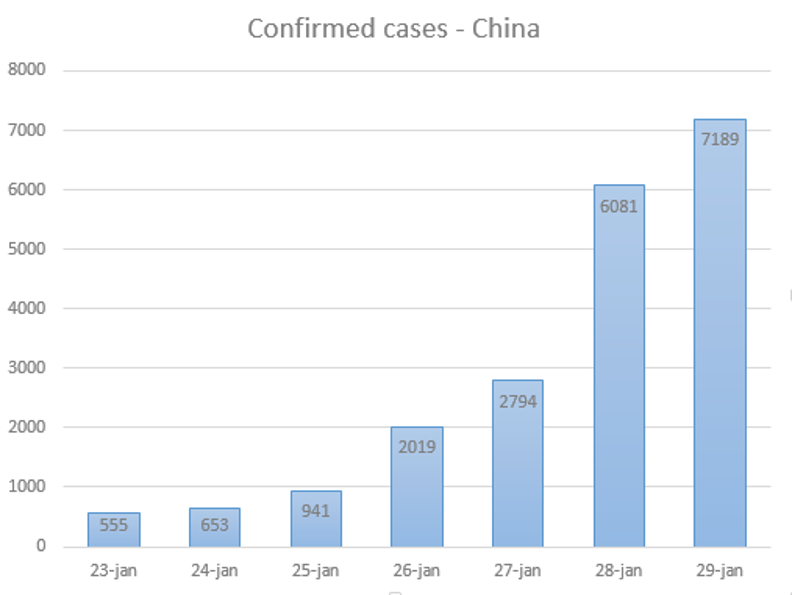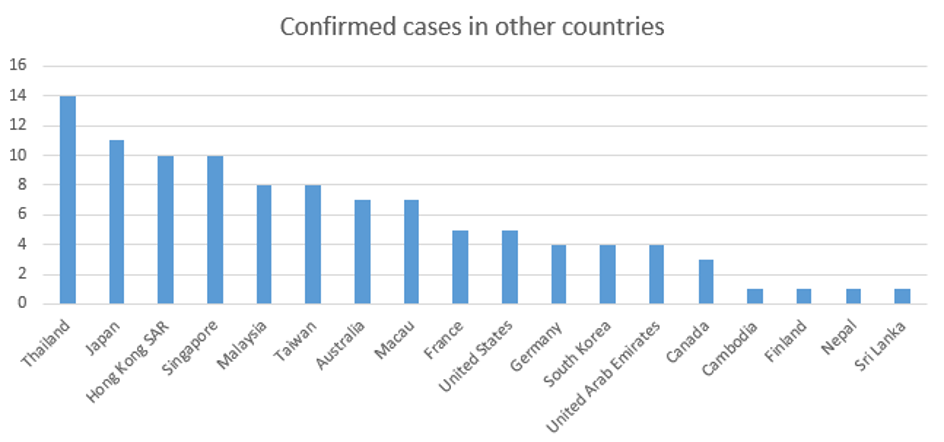SAFEY CASE STUDY: CORONAVIRUS
The novel coronavirus (2019-nCoV) outbreak, that emerged from a live animal market in the city of Wuhan, Hubei Province in December 20 19, is continuing to spread, and as of 30 January the number of confirmed cases of infection in China has reached over 7000. The situation is developing rapidly, and during the last few days the number of confirmed cases in China has increased quickly. The number of people who have succumbed to the disease has passed 170 people.

Small number of cases have occurred in more than ten countries around the world, including the US, Japan, South Korea, Germany and Thailand.

Impact on travel and trade
During the last week the impact on travel has ramped up. Russia closed down border crossings with China on 29 January. Aviation authorities have implemented health screening at airports around the world. Multiple major airlines have suspended or decreased their flight services to China due to the outbreak of coronavirus. The following airlines have suspended flight operations to China:
American Airlines IndiGo
Air Canada JetStar Asia
Air India Korean Air
Austrian Airlines Lion Air
British Airways Lufthansa
Cathay Pacific Airways Malaysia Airlines
El Al Airlines Qatar Airways
Finnair Scat Airlines
JetStar Asia Swiss Airlines
Iberia United Airlines
SAS
The outbreak is expected to have a noticeable impact on trade. Authorities have taken the measure of extending the Lunar New Year, leading to increased downtime for many export companies. The Chinese national economy will be most affected overall, but disturbances to supply of various export goods may also result in shortages and price hikes in overseas markets. The effects of these supply disruptions may materialize gradually over the coming weeks.
Combating misinformation amid spread of coronavirus
As the outbreak of coronavirus accelerates, the spread of “fake news” about it also multiplied in several countries. A number of bogus claims were made and among others, they include:
- The location where the virus actually started was a market in Indonesia.
- A contaminated market in Sydney, Australia
- False projection of entire population of Wuhan was infected
The worrying trend has forced governments to act in order to prevent conspiracy theorists, trolls and cynics to boost traffic of their accounts, at the expense of stoking fears among the public. For instance, the South Korean, Singaporean, Malaysian as well as the Australian governments have all launched crackdowns on such misinformation that was spread via social media outlets, such as Facebook and WhatsApp, amid concerns that they could result in a panic among the general public.
To minimize the negative impact of such misinformation:
- Only trust information from credible sources, such as the health authorities or reputable new agencies;
- Always read all the information about the virus that you have received/seen before sharing them.
Risk assessment
The number of cases is likely to continue to increase significantly over the next week as persons previously exposed to the virus develop symptoms. With the lockdown of Wuhan, Hubei province, the number of cases exported from the city will gradually be reduced, and the rise in cases in other parts of China will likewise slow. Although the effects of the lockdowns and travel restrictions in China will take effect and mitigate spread more over the coming weeks, it remains difficult to predict when the outbreak may reach a peak point. From an international perspective, the level of vigilance and preparedness among authorities is high. Even though similar lockdowns such as those imposed in China may become necessary in other countries, they are likely to be more limited in geographical scope.
On 30 January, the World Health Organization declared a global health emergency, also known as a Public Health Emergency of International Concern, is a formal declaration of an extraordinary event, where the disease has risk to spread internationally, and an international response may be required in taking a multi-national approach to containing the spread of disease, like coronavirus. The declaration of such an emergency, inclines countries to step-up their preparation and prevention against the spread of the virus.
With over 7000 infected so far and around 170 fatalities, the virus has an estimated fatality rate of 2 to 3 percent. Compared to the last major coronavirus outbreak, the SARS outbreak of 2003, which reached 33 countries, the novel coronavirus is considerably lower since that virus strain was fatal in circa 10 percent of those infected.
Advice
- It is advisable to avoid all travel to Hubei province due to stringent travel restrictions amid the outbreak.
- Avoid non-essential travel to rest of mainland China (Hong Kong SAR and Macau SAR excluded) due to an increase in travel restrictions imposed by the government.
- If undertaking travel, maintain flexible itineraries.
- Health care professionals are advised to consistently apply appropriate infection prevention and control measures.
- Follow all official directives, including wearing of face masks in public places in Wuhan.
- For travelers from China, and humanitarian workers: it is advisable to watch for any changes in health for 14 days after leaving China.
- Seek medical attention if you develop a fever, a cough or difficulty breathing within 14 days.
- Inform your health service prior to attendance about your recent travel to the city.
- Cover your mouth and nose with a tissue or your sleeve when coughing or sneezing.
- Wash hands often with soap and water for at least 20 seconds.
- Use an alcohol-based hand sanitizer if soap and water are not available.
- Avoid touching your eyes, nose, and mouth with unwashed hands.
- Avoid close contact with people who are sick.
Contributors
Chan Hoi Cheong
Senior Analyst and Office Manager Malaysia
Naddja Kim
Senior Analyst
Rickard Larsson
Senior Analyst
Copyright Safeture 2020
